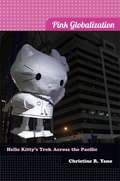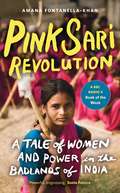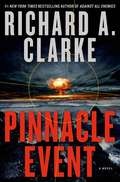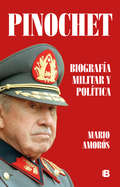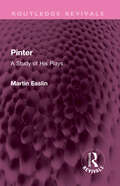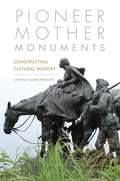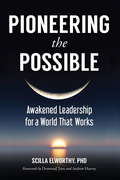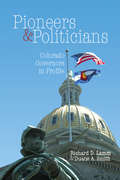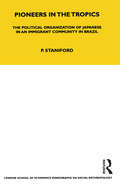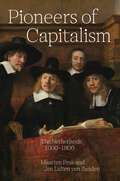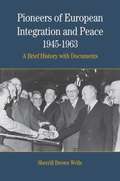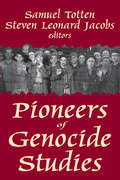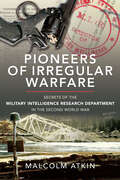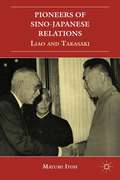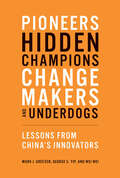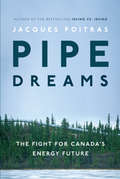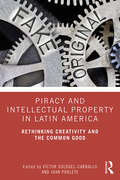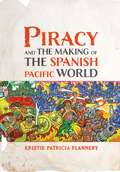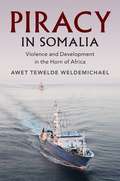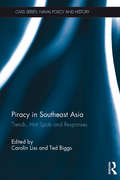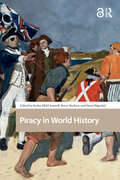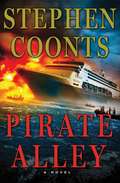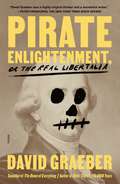- Table View
- List View
Pink Globalization: Hello Kitty's Trek across the Pacific
by Yano Christine R.In Pink Globalization, Christine R. Yano examines the creation and rise of Hello Kitty as a part of Japanese Cute-Cool culture. Yano argues that the international popularity of Hello Kitty is one aspect of what she calls pink globalization--the spread of goods and images labeled cute (kawaii) from Japan to other parts of the industrial world. The concept of pink globalization connects the expansion of Japanese companies to overseas markets, the enhanced distribution of Japanese products, and the rise of Japan's national cool as suggested by the spread of manga and anime. Yano analyzes the changing complex of relations and identities surrounding the global reach of Hello Kitty's cute culture, discussing the responses of both ardent fans and virulent detractors. Through interviews, Yano shows how consumers use this iconic cat to negotiate gender, nostalgia, and national identity. She demonstrates that pink globalization allows the foreign to become familiar as it brings together the intimacy of cute and the distance of cool. Hello Kitty and her entourage of marketers and consumers wink, giddily suggesting innocence, sexuality, irony, sophistication, and even sheer happiness. Yano reveals the edgy power in this wink and the ways it can overturn, or at least challenge, power structures.
Pink Sari Revolution: A Tale of Women and Power in the Badlands of India
by Amana Fontanella-KhanWhen Sheelu was arrested for stealing from a powerful politician in the notoriously crooked region of Uttar Pradesh, she was sure that she would be forced to accept a prison sentence, not least because she had alleged that she had been assaulted by a man in the politician's household. But then Sampat Pal heard word of the charges, and the formidable commander of the pink-sari-wearing, pink-baton-wielding, 20,000-strong 'Pink Gang' decided to shake things up. Narrating the story of Sampat Pal and the Pink Gang's fight for Sheelu, as well as for others facing injustice and oppression, journalist Amana Fontanella-Khan delivers a riveting portrait of women grabbing fate with their own hands - and winning back their lives.
Pinnacle Event
by Richard A. ClarkeWith the 2016 presidential election just weeks away, five simultaneous murders on three continents lead to an investigation revealing the recent black-market sale of five nuclear weapons. But who bought them? And what is their intended target? Washington fears the bombs are timed to explode in major American cities before the election. They call on intelligence expert Ray Bowman to prevent the attack. With the help of a Mossad agent and a female South African intelligence officer, he follows a trail across the world to track down the missing nukes. Along the way, he discovers that the people who now control the bombs intend to do something much more devastating than expected, something that will make nuking a few cities look like a mild attack. Drawing on his decades of experience at the highest levels of national security, Richard A. Clarke's Pinnacle Event--the Pentagon code for a nuclear threat--is a gripping international thriller told from the rare vantage point of a true Washington insider.
Pinochet. Biografía militar y política
by MARIO AMOROSEn la actualidad, cuando una ola reaccionaria recorre el planeta y diferentes voces en distintos países lo reivindican, esta biografía de Augusto Pinochet se vuelve más urgente que nunca. El general Augusto Pinochet integra el panteón de las personalidades más siniestras de la historia. No solo en Chile, donde su régimen se cobró la vida de miles de personas, torturó a tantas otras y destruyó la democracia republicana, sino también a nivel mundial. El golpe de Estado del 11 de septiembre de 1973 que derrocó al presidente Salvador Allende y su posterior dictadura, que se prolongó hasta 1990; la imposición feroz de los principios del neoliberalismo a partir de 1975 y su alto costo en desempleo y hambre, y su detención en Londres en 1998 a petición del juez Baltasar Garzón, fundada en la jurisdicción universal frente a los crímenes de lesa humanidad, lo transforman en un personaje ineludible cuya figura regresa cada cierto tiempo.Amorós, apoyándose en una amplísima documentación inédita, reconstruye la infancia de Pinochet y su vida familiar, relata al detalle su larga trayectoria militar, y desvela episodios ocultos como su participación en la masonería; examina su papel durante el gobierno de Allende y en las horas dramáticas del golpe de Estado, y perfila su ambición de poder, que lo llevó a erigir un régimen que, a partir del terror, refundó Chile desde sus cimientos.
Pinter: A Study of His Plays (Routledge Revivals)
by Martin EsslinFirst published in 1977, the third edition of Pinter is an excellent analysis of Harold Pinter and his works. Written when Pinter was only a few plays old, the book draws on several sources, including interviews with Pinter himself, to comment on Pinter’s career, his aesthetic and philosophical choices, and his oeuvre as a writer. The section devoted to his individual plays has been arranged in a chronological manner to visually represent the growth of the playwright and the relationship shared between his early and later works. Esslin, known for coining the term ‘theatre of the absurd,’ was himself an inspiration to Pinter and hence, the book records an intellectual and creative exchange between the author and his subject. The book will be of interest to students of literature, drama, history as well as to an academically inclined theatre audience.
Pioneer Mother Monuments: Constructing Cultural Memory
by Cynthia Culver PrescottThe angelic woman in a sunbonnet, armed with a rifle or a Bible as she carried civilization forward--an iconic figure--resonated particularly with Mormon audiences. While interest in these traditional monuments began to wane in the postwar period, according to Prescott, a new wave of pioneer monuments emerged in smaller communities during the late twentieth century.
Pioneering the Possible
by Desmond Tutu Andrew Harvey Scilla ElworthyThree-time Nobel Peace Prize nominee Dr. Scilla Elworthy, a realist with 40 years' experience at the sharp end of politics and conflict, presents a bold but realistic vision for the future in Pioneering the Possible. Human beings worldwide are anxious, afraid for their children's futures, dissatisfied by their lives, but unsure what to do. Our global ecosystems and supply chains are under threat and our leaders appear to have failed us. Pioneering the Possible addresses these anxieties head-on by envisioning a future that could work for everyone, rich and poor, demonstrating with real-life examples how that future is already emerging. Pioneering the Possible tackles the deeply embedded 20th-century values that get in the way of addressing global problems, and shows how these destructive values can be--and are being--reversed. We know the world is in crisis: we are spoiling our planet at such a rate that soon it may be unable to sustain human life. This crisis is in fact a vast opportunity, because a secure and satisfying future for all of humanity is perfectly possible if we make the right choices. But building such a future will require the leap in consciousness that Einstein indicated when he said, "No problem can be solved from the consciousness that created it." Pioneering the Possible investigates what this new consciousness is and takes us to meet the leaders who have learned to apply it. With profiles of individuals who exemplify transformative leadership such as Dr. Desmond Tutu and Aung San Suu Kyi, Dr. Elworthy demonstrates how anyone can develop the magnificent inner power to build their own personal contribution to the future and become a 21st-century pioneer of what's possible. The book then contrasts the value systems that underpin our current decisions with the kind of values that would enable us to make better choices--those that could get us out of the mess we're in. To envision the kind of future that is possible--a lift-off into life as it could be--Elworthy calls on some experienced specialists to look through their telescopes into the future, then brings in the pragmatists who know what to do in their fields, because they've done it, tested it, and made it work. Pioneering the Possible ultimately helps you find your unique way to be useful; as Dr. Elworthy says, "to discover your mission and put it into action--instead of worrying on the sidelines--is to find peace of mind and a heart full of love."From the Trade Paperback edition.
Pioneers & Politicians
by Duane A. Smith Richard D. LammAn illuminating collection of biographies of Colorado's governors, from 1876 to present.
Pioneers in the Tropics: The Political Organisation of Japanese in an Immigrant Community in Brazil (LSE Monographs on Social Anthropology #No. 45)
by Philip StanifordThis study of a substantial Japanese immigrant community in Brazil concentrates on its development of a political organization to cope with internal problems of co-operation and conflict and to deal with the outside world of Brazilian politicians and merchants. After many early troubles the immigrants developed pepper growing as a cash crop and now seem on the way to prosperity. The analysis, which makes use of the concept of network interaction, is of relevance to all interested in community migration and development of new rural settlements.
Pioneers of Capitalism: The Netherlands 1000–1800 (The Princeton Economic History of the Western World #132)
by Maarten Prak Jan Luiten van ZandenHow medieval Dutch society laid the foundations for modern capitalismThe Netherlands was one of the pioneers of capitalism in the Middle Ages, giving rise to the spectacular Dutch Golden Age while ushering in an era of unprecedented, long-term economic growth. Pioneers of Capitalism examines the formal and informal institutions in the Netherlands that made this economic miracle possible, providing a groundbreaking new history of the emergence and early development of capitalism.Drawing on the latest quantitative theories in economic research, Maarten Prak and Jan Luiten van Zanden show how Dutch cities, corporations, guilds, commons, and other private and semipublic organizations provided safeguards for market transactions in the state&’s absence. Informal institutions developed in the Netherlands long before the state created public safeguards for economic activity. Prak and van Zanden argue that, in the Netherlands itself, capitalism emerged within a robust civil society that constrained and counterbalanced its centrifugal forces, but that an unrestrained capitalism ruled in the overseas territories. Rather than collapsing under unrestricted greed, the Dutch economy flourished, but prosperity at home came at the price of slavery and other dire consequences for people outside Europe.Pioneers of Capitalism offers a panoramic account of the early history of capitalism, revealing how a small region of medieval Europe transformed itself into a powerhouse of sustained economic growth, and changed the world in the process.
Pioneers of European Integration and Peace 1945-1963: A Brief History with Documents
by Sherrill Brown WellsThis book explores the political risks taken by those farsighted leaders in the postwar period to heal the wounds of hostility and prevent another war.
Pioneers of Genocide Studies
by Samuel Totten Steven Leonard JacobsFrom the early efforts that emerged in the struggle against Nazism, and over the past half century, the field of genocide studies has grown in reach to include five genocide centers across the globe and well over one hundred Holocaust centers. This work enables a new generation of scholars, researchers, and policymakers to assess the major foci of the field, develop ways and means to intervene and prevent future genocides, and review the successes and failures of the past.The contributors to Pioneers of Genocide Studies approach the questions of greatest relevance in a personal way, crafting a statement that reveals one's individual voice, persuasions, literary style, scholarly perspectives, and relevant details of one's life. The book epitomizes scholarly autobiographical writing at its best. The book also includes the most important works by each author on the issue of genocide.Among the contributors are experts in the Armenian, Bosnian, and Cambodian genocides, as well as the Holocaust against the Jewish people. The contributors are Rouben Adalian, M. Cherif Bassiouni, Israel W. Charney, Vahakn Dadrian, Helen Fein, Barbara Harff, David Hawk, Herbert Hirsch, Irving Louis Horowitz, Richard Hovannisian, Henry Huttenbach, Leo Kuper, Raphael Lemkin, James E. Mace, Eric Markusen, Robert Melson, R.J. Rummel, Roger W. Smith, Gregory H. Stanton, Ervin Staub, Colin Tatz, Yves Ternan, and the co-editors. The work represents a high watermark in the reflections and self-reflections on the comparative study of genocide.
Pioneers of Irregular Warfare: Secrets of the Military Intelligence Research Department of the Second World War
by Malcolm AtkinCovert operations and ingenious weapons for irregular warfare were developed rapidly, and with great success, by the British during the Second World War, and the story of the most famous organizations involved like SOE, the SAS and Section D of SIS is now well known, but Military Intelligence (Research), the smallest but one of the most influential of these units is relatively unknown. Malcolm Atkin’s intriguing and meticulously researched account describes their role at the heart of the War Office in trying to develop a ‘respectable’ arm of irregular warfare and their innovations ranging from the early Commandos, sticky bombs, limpet mines, booby traps, and even helicopters to the creation of the MI9 escape organization. They were an ‘ideas factory’ rather than an operational body but the book describes their worldwide operations including Finland, Norway, Romania, the Middle East and Central Africa. This is also a story of conflicting personalities between Jo Holland, the visionary but self-effacing head of MI(R) and his ambitious deputy, Colin Gubbins (later head of SOE), and the latter’s private war with SIS.
Pioneers of Sino-Japanese Relations
by Mayumi ItohThis book examines the careers of Liao Chengzhi and Takasaki Tatsunosuke, who were not only the architects of Sino-Japanese economic relations, but also pioneers of contemporary Sino-Japanese relations. Their visions and initiatives offer many insights into the current contentious relations among China, Japan, Russia, and the United States.
Pioneers, Hidden Champions, Changemakers, and Underdogs: Lessons from China's Innovators (The\mit Press Ser.)
by George S. Yip Wei Wei Mark J. GreevenAn insider's view of China's under-the-radar, globally competitive innovators.Chinese innovators are making their mark globally. Not only do such giants as Alibaba and Huawei continue to thrive and grow through innovation, thousands of younger Chinese entrepreneurs are poised to enter the global marketplace. In this book, Mark Greeven, George Yip, and Wei Wei offer an insider's view of China's under-the-radar, globally competitive innovators. The authors, all experts on Chinese innovation, distinguish four types of innovators in China: pioneers, large companies that are globally known; hidden champions, midsize enterprises that are market leaders in their niches; underdogs, technology-driven ventures with significant intellectual property; and changemakers, newer firms characterized by digital disruption, exponential growth, and cross-industry innovations. They investigate what kinds of innovations these companies develop (product, process, or business model), their competitive strategies, and key drivers of innovation. They identify six typical ways Chinese entrepreneurs innovate, including swarm innovation (collectively pursuing opportunities) and rapid centralized decision making. Finally, they look at how Chinese innovators are going global, whether building R&D networks internationally or exporting disruptive business models. The book includes many examples of Chinese innovators and innovations, drawn from a range of companies—from pioneers to changemakers—including Alibaba, Haier, Hikvision, Malong Technology, Weihua Solar, Mobike, and Cheetah Mobile. Greeven, Yip, and Wei offer an essential guide to what makes China a heavyweight competitor in the global marketplace.
Pipe Dreams: The Fight for Canada's Energy Future
by Jacques PoitrasA timely chronicle of how Canada's oil pipelines have become hotbeds for debate about our energy future, Indigenous rights, environmental activism, and east-west political tensions. Pipe Dreams is the dramatic story of the rise and fall of the Energy East pipeline and the broader battle over climate and energy in Canada. The project was to be a monumental undertaking, beginning near Edmonton, AB, and stretching over four thousand kilometres, through Montreal to the Irving Oil refinery in Saint John, NB. Conceived as a back-up plan for the stalled Keystone XL pipeline, it became the crucible for a national debate over the future of oil. In a cross-country journey, Poitras talked to industry executives, prairie ranchers, First Nations chiefs, mayors, premiers, cabinet ministers, and refinery workers. He also explored Canada's perplexing oil relationship with the United States: our industry is literally tied to its American counterpart with sinews of steel. The Energy East pipeline represented a new direction, designed to get Alberta oil sands crude to lucrative world markets. Yet it was promoted in explicitly nationalist terms: the country was said to be reorienting itself along its east-west axis, tying itself together, again, with a great feat of engineering. By the time the journey ended, the story had become a kind of whodunit: Poitras witnessed the slow-motion killing of the fifteen billion dollar project. Unfolding in tandem with clashes over the Trans Mountain pipeline, Energy East's demise heralded a potential turning point not just for a single proposal, but for Canada's carbon economy.Entertaining, informative, and insightful, Pipe Dreams offers a clear picture of the complicated political, environmental, and economic issues that Canadians face.
Pipeline Populism: Grassroots Environmentalism in the Twenty-First Century
by Kai BosworthHow contemporary environmental struggles and resistance to pipeline development became populist struggles Stunning Indigenous resistance to the Keystone XL and the Dakota Access pipelines has made global headlines in recent years. Less remarked on are the crucial populist movements that have also played a vital role in pipeline resistance. Kai Bosworth explores the influence of populism on environmentalist politics, which sought to bring together Indigenous water protectors and environmental activists along with farmers and ranchers in opposition to pipeline construction.Here Bosworth argues that populism is shaped by the &“affective infrastructures&” emerging from shifts in regional economies, democratic public-review processes, and scientific controversies. With this lens, he investigates how these movements wax and wane, moving toward or away from other forms of environmental and political ideologies in the Upper Midwest. This lens also lets Bosworth place populist social movements in the critical geographical contexts of racial inequality, nationalist sentiments, ongoing settler colonialism, and global empire—crucial topics when grappling with the tensions embedded in our era&’s immense environmental struggles.Pipeline Populism reveals the complex role populism has played in shifting interpretations of environmental movements, democratic ideals, scientific expertise, and international geopolitics. Its rich data about these grassroots resistance struggles include intimate portraits of the emotional spaces where opposition is first formed. Probing the very limits of populism, Pipeline Populism presents essential work for an era defined by a wave of people-powered movements around the world.
Piracy and Intellectual Property in Latin America: Rethinking Creativity and the Common Good
by Juan Poblete Victor Goldgel-Carballo PashtanPiracy and Intellectual Property in Latin America is the first sustained effort to present an alternative framework for understanding piracy and contemporary challenges to global discourses on intellectual property (IP) in the Americas. While piracy might just look like theft and derivative reproduction from the perspective of many right-holders, the contributors to this volume go beyond this economic-driven logic and show how practices of copying are in fact practices of reinvention that reflect the rich social networks and forms of creativity, authorship, commerce, and consumption that characterize informal economies. From a perspective informed by contemporary scenarios in Mexico, Brazil, Chile, Argentina, Peru, Guatemala, and the United States, they engage in a discussion of alternatives that—predicated on the importance of protecting culture—allow for other ways of conceiving prosperity at local, national, regional, and global levels. Examples discussed include video games, clothing, trinkets, music, film, TV, and books. Designed to help understand the broader implications of IP and piracy for the field of Latin American studies, this book will be a major contribution to Global South studies, as well as to the growing bibliography on globalization, informal markets, and piracy.
Piracy and the Making of the Spanish Pacific World (The Early Modern Americas)
by Kristie FlanneryPiracy and the Making of the Spanish Pacific World offers a new interpretation of Spanish colonial rule in the Philippine islands. Drawing on the rich archives of Spain’s Asian empire, Kristie Patricia Flannery reveals that Spanish colonial officials and Catholic missionaries forged alliances with Indigenous Filipinos and Chinese migrant settlers in the Southeast Asian archipelago to wage war against waves of pirates, including massive Chinese pirate fleets, Muslim pirates from the Sulu Zone, and even the British fleet that attacked at the height of the Seven Years’ War. Anti-piracy alliances made Spanish colonial rule resilient to both external shocks and internal revolts that shook the colony to its core.This revisionist study complicates the assumption that empire was imposed on Filipinos with brute force alone. Rather, anti-piracy also shaped the politics of belonging in the colonial Philippines. Real and imagined pirate threats especially influenced the fate and fortunes of Chinese migrants in the islands. They triggered genocidal massacres of the Chinese at some junctures, and at others facilitated Chinese integration into the Catholic nation as loyal vassals.Piracy and the Making of the Spanish Pacific World demonstrates that piracy is key to explaining the surprising longevity of Spain’s Asian empire, which, unlike Spanish colonial rule in the Americas, survived the Age of Revolutions and endured almost to the end of the nineteenth century. Moreover, it offers important new insight into piracy’s impact on the trajectory of globalization and European imperial expansion in maritime Asia.
Piracy and the Privatisation of Maritime Security: Vessel Protection Policies Compared
by Eugenio Cusumano Stefano RuzzaIn response to pirate attacks in the Western Indian Ocean, countries worldwide have increasingly authorized the deployment of armed guards from private military and security companies (PMSCs) on merchant ships. This widespread trend contradicts states’ commitment to retain a monopoly on violence and discourage the presence of arms on civilian vessels. This book conceptualizes the extensive use of PMSCs as a form of institutional isomorphism, combining the functionalist, ideational, political and organizational arguments used to account for the privatization of security on land into a synthetic explanation of the commercialization of vessel protection.
Piracy in Somalia: Violence and Development in the Horn of Africa
by Awet Tewelde WeldemichaelPiracy in Somalia sheds light on an often misunderstood world, oversimplified and demonized in the media and largely decontextualized in scholarly and policy works. It examines the root causes of piracy in Somalia, its impact on coastal communities, local views about it, and the measures taken against it. Drawing on six years' worth of extensive fieldwork, Awet Weldemichael amplifies the voices of local communities who have suffered under the heavy weight of illegal fishing, piracy and counter-piracy and makes their struggles comprehensible on their own terms. He also exposes complex webs of crimes within crimes of double-dealing pirates, fraudulent negotiators, duplicitous intermediaries, and treacherous foreign illegal fishers and their local partners. In so doing, this book will help inform regional and global counter-piracy endeavors, avoid possible reversals in the gains so far made against piracy, and identify the gains that need to be made against its root causes.
Piracy in Southeast Asia: Trends, Hot Spots and Responses (Cass Series: Naval Policy and History)
by Carolin Liss Ted BiggsThis book combines multi-disciplinary ethnographic and theoretical approaches to examine piracy in Southeast Asia and the regional and international responses to this threat. During the piracy boom of the early to mid-2000s, the issue of piracy in Southeast Asia received substantial academic attention. Recent scholarship, however, has shifted the focus to Somali piracy and the resurgence of piracy in Southeast Asia has largely been neglected in the academic community. This volume seeks to remedy this gap in the current literature. The primary aim is to examine how piracy has evolved in Southeast Asia over the past ten years, to address why piracy has re-emerged as a security threat, to evaluate efforts at maintaining security in regional waters, and to offer an analysis of what might be expected in the next decade. The contributions are drawn from academics, policy makers, and military officers, covering a range of disciplines including international relations, socio-cultural anthropology, security studies, history, law, and Asian studies. Taken together, the contributions in this volume provide a better understanding of contemporary piracy in Southeast Asia and suggest avenues to successfully combat piracy in this region. This book will be of much interest to students of maritime security, Asian politics, security studies, and international relations in general.
Piracy in World History
by Bruce Buchan Stefan Eklöf Amirell Hans HägerdalIn a modern global historical context, scholars have often regarded piracy as an essentially European concept which was inappropriately applied by the expanding European powers to the rest of the world, mainly for the purpose of furthering colonial forms of domination in the economic, political, military, legal and cultural spheres. By contrast, this edited volume highlights the relevance of both European and non-European understandings of piracy to the development of global maritime security and freedom of navigation. It explores the significance of ‘legal posturing’ on the part of those accused of piracy, as well as the existence of non-European laws and regulations regarding piracy and related forms of maritime violence in the early modern era. The authors in Piracy in World History highlight cases from various parts of the early-modern world, thereby explaining piracy as a global phenomenon.
Pirate Alley (Tommy Carmellini #5)
by Stephen CoontsGRAFTON AND CARMELLINI ARE BACK, BATTLING TERRORISTS ON THE HIGH SEAS ALONGSIDE A TOP-NOTCH TEAM OF NAVY SEALS IN AN ACTION-PACKED TALE BY NEW YORK TIMES BESTSELLING AUTHOR STEPHEN COONTS. A luxurious vacation cruise to the exotic locales of the Red Sea and the Gulf of Aden turns into a nightmare for passengers and crew when their ship is suddenly attacked and captured by a band of bloodthirsty Somali pirates. An initial rescue mission ends in failure, and the decks are covered in blood. Unless they are paid a ransom of $200 million within seven days, the pirates threaten to execute all their hostages. But information gleaned from a captured Al Qaeda operative indicates that there is a far more dangerous conspiracy afoot. Once the ransom is paid, Islamic militants intend to swoop in and slaughter the passengers in an orgy of terror, hoping to provoke a massive American military response that will set the Muslim world aflame. Jake Grafton is assigned to negotiate with the brutal pirate chief while his right-hand man, Tommy Carmellini, and a team of CIA and Navy SEAL operatives mount an undercover operation to save the hostages and keep the United States from being maneuvered into a murderous war.
Pirate Enlightenment, or the Real Libertalia
by David GraeberThe final posthumous work by the coauthor of the major New York Times bestseller The Dawn of Everything.Pirates have long lived in the realm of romance and fantasy, symbolizing risk, lawlessness, and radical visions of freedom. But at the root of this mythology is a rich history of pirate societies—vibrant, imaginative experiments in self-governance and alternative social formations at the edges of the European empire.In graduate school, David Graeber conducted ethnographic field research in Madagascar for his doctoral thesis on the island’s politics and history of slavery and magic. During this time, he encountered the Zana-Malata, an ethnic group of mixed descendants of the many pirates who settled on the island at the beginning of the eighteenth century. Pirate Enlightenment, or the Real Libertalia, Graeber’s final posthumous book, is the outgrowth of this early research and the culmination of ideas that he developed in his classic, bestselling works Debt and The Dawn of Everything (written with the archaeologist David Wengrow). In this lively, incisive exploration, Graeber considers how the protodemocratic, even libertarian practices of the Zana-Malata came to shape the Enlightenment project, which for too long has been defined as distinctly European. He illuminates the non-European origins of what we consider to be “Western” thought and endeavors to recover forgotten forms of social and political order that gesture toward new, hopeful possibilities for the future.
